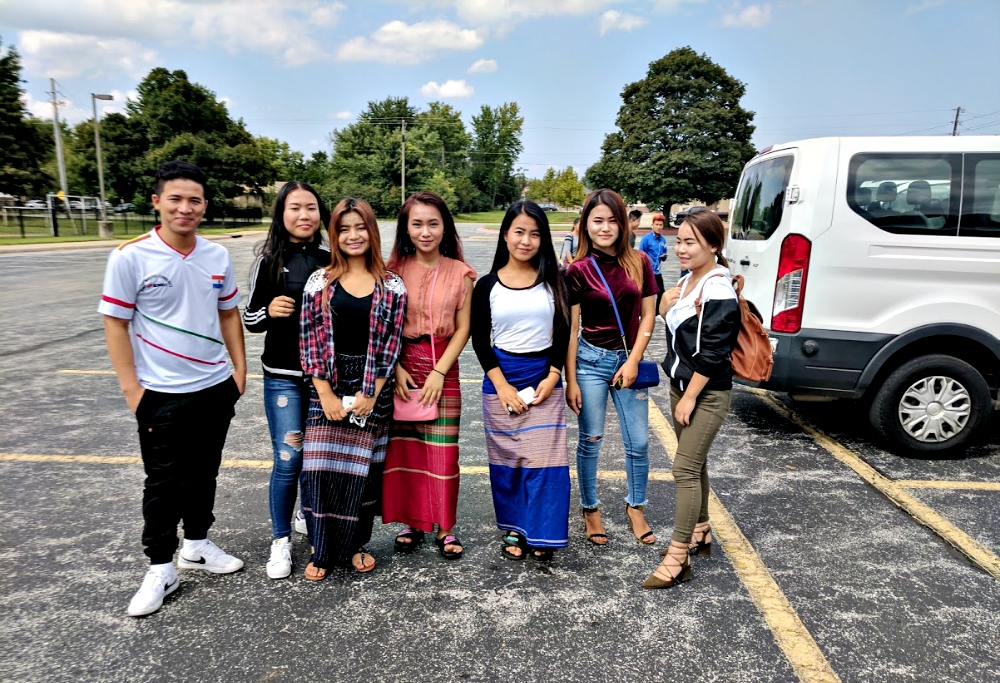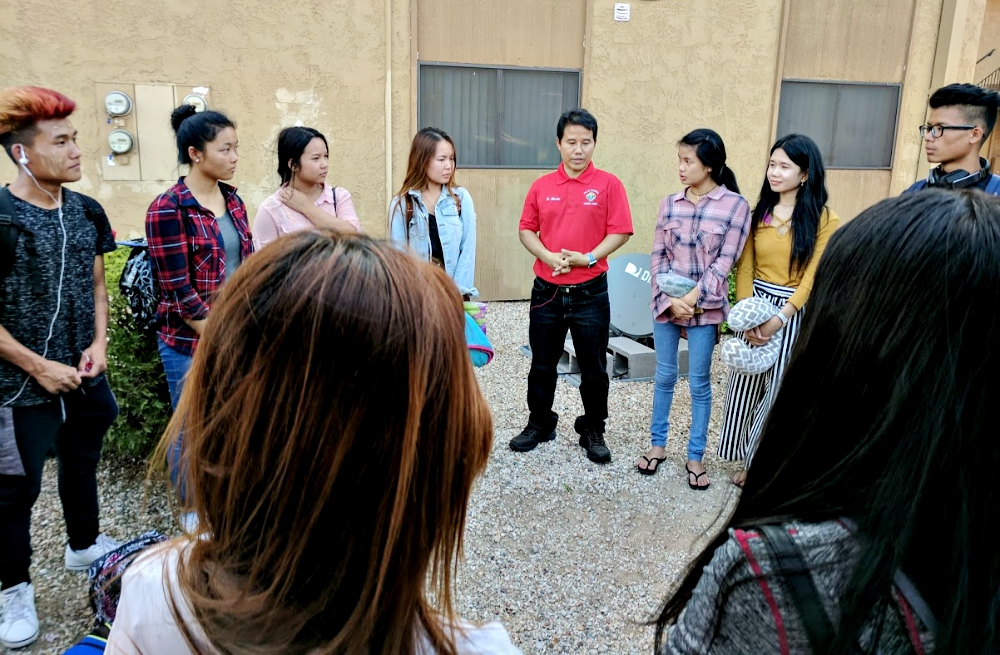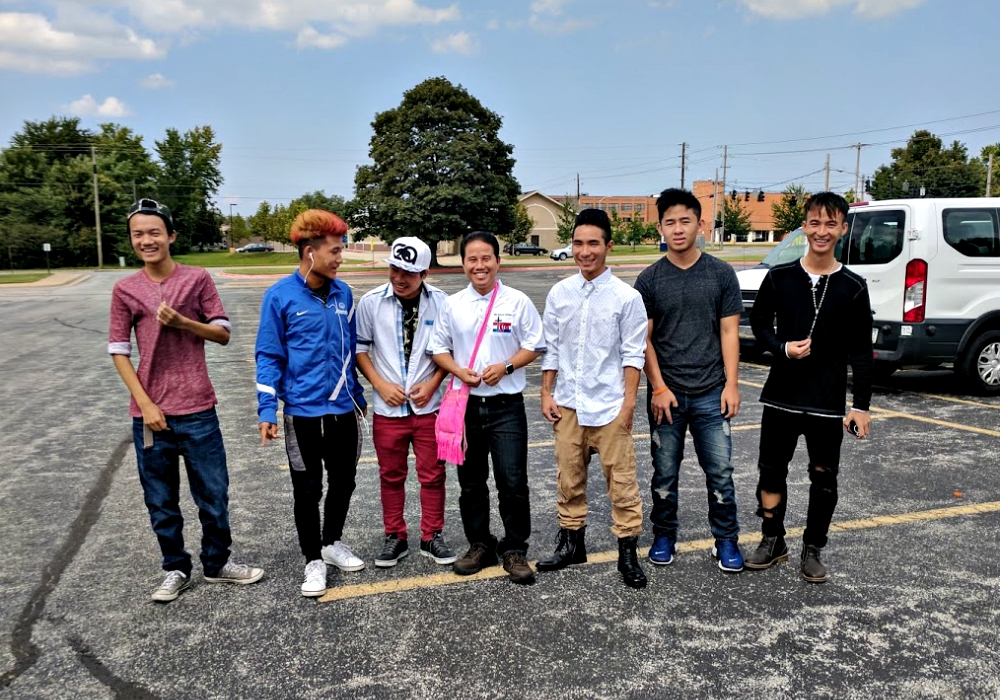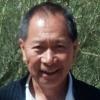
Young Karenni Catholics from Phoenix attend the fourth annual retreat organized by the Karenni-American Catholic Association in in Rogers, Arkansas, Sept. 2-3. (Peter Tran)
Around 30 Karenni Catholic young adults, ages 15-23, gather around Fr. Shiareh Marino in the parking lot of a Phoenix apartment complex Aug. 31. They look like any other young Americans with smartphones and earbuds, listening to Burmese or American pop music, watching Korean drama or comedy shows, or playing games.
Marino, in his 30s, asks for their attention and prays for a safe trip for the group. They are traveling in two passenger vans for more than 1,000 miles to Rogers, Arkansas, for their fourth annual retreat, held Sept. 2-3. The program, organized by the Karenni-American Catholic Association, includes spiritual talks, Mass, prayers, music and dancing.

Fr. Shiareh Marino (in red shirt) gathers the group of young Karenni Catholics for prayer Aug. 31 in Phoenix before they leave for a retreat in Rogers, Arkansas. (Peter Tran)
“We were singing all night to keep our driver awake,” one of the girls said later at a gas station in the middle of the night. Some, with sleepy eyes, came out of the store with assorted munchies that mothers would frown upon. The Arizona landscape disappeared into darkness as the pilgrims dozed off, lulled by the faint hum of the tires on the road while their vans headed into New Mexico.
Less than 10 years ago, all of these Karenni young adults were languishing in refugee camps in Thailand. Many of them were born in camps in Mae Hong Son, Thailand’s western province. The camps, located in the steep mountains on the border of a malaria-infested jungle, had hundreds of bamboo huts spread everywhere.
Zarni Oo and Nga Meh, both 15, said they don’t remember much about life in the camp. “But my mother explained to me that life was very poor.” Nga said.
Two sisters, Nha Meh and Mo Meh, 18 and 16, said they used to run around freely and played in the camp. Augustine Reh, Neh Neh, Nyinyi Tun and Klo Ru, all in their late teens, had fond memories of the camps, as they were free to go into the jungle, forage for edible greens, hunt for birds or other small animals, and catch fish or freshwater crabs.
Except for a few, most in the group do not remember much of life back in their homeland in Kayah State in east central Myanmar. Bores Reh, 20, one of the oldest in the group, does remember why his parents took him and his siblings across the border to Thailand.
“My uncle was kidnapped. The Burmese soldiers came into the village and killed people,” he said.
Hundreds of thousands of Burmese of various ethnicities (Shan, Karen, Arakan, Mon, Chin, Kachin, Karenni) fled to Thailand in the 1980s and 1990s. They escaped because the government used force to suppress separatist rebel groups. Older refugees told accounts of homes being burned down, forced relocation, rape and killing. They lived in camps in Thailand and Malaysia.
Bores said although life in the camp was free, there was no future for children or families. Joseph Htee, 23, agreed. He said you could not go anywhere in the camp except into the jungle. These young Karenni and their parents were resettled in the United States, which has accepted thousands of Karenni refugees since 2008. Many of them would see old friends from the camps at this annual retreat.
Both Htee and Bores came to the United States when they were older and had some difficulty with English, but both are now working.
“Life is better here, I’m free to have a job,” said Htee, a machine operator in Phoenix.
Bores, an Asian market store worker, said he is not sure of what the future will bring.
“It is harder living here in the United States because it is difficult if you don’t know English, but we are free," he said. "Like anyone else, I want to work and I am free to work. I want to have a good family. The future is difficult, but I am hopeful.”

Some of the pilgrims from Phoenix at the retreat on Sept. 2 (Peter Tran)
“The United States gives us a lot of opportunities to learn new things, and experience a new life,” Zarni said.
They all aspire to go to college, to have a good job and to be of service. “I want to be a nurse and help others,” said Tolo Julio Lo, 15. Medical careers like doctors and nurses are popular among the young group. Others want to teach. A few of them want to be computer engineers.
The one thing they all have in common is their devotion to their church gathering in Phoenix. “We enjoy going to church, as we pray and sing in our language,” said Neh Neh. With their busy lives in school and working, they are happy to hang out together. They feel united when they go to church.
Asked what they were expecting at the annual retreat in Arkansas, they looked forward to seeing old friends from the camps and listening to talks from Shiareh; Fr. Peter Dee De, who ministers to the Karenni Catholics in the Diocese of Fort Wayne, Indiana; and Bishop Stephen Tjephe of Loikaw, Myanmar.
Advertisement
The retreat ended late Sept. 3. The Phoenix group gathered before departure to pray for a safe trip home. The journey home seemed to go a little faster, and we arrived at the meeting point in Phoenix on the afternoon of Sept. 4.
Before taking them back home, Shiareh said he was proud of them with their contribution to the weekend.
“You all look very tired, but thank you for participating in this wonderful retreat,” he said.
[Peter Tran is a former editor of the Union of Catholic Asian News at the main editorial office in Bangkok. He was involved for some 20 years with refugee ministry in the United States and at the Vatican. He is now assistant director of the Redemptorist Renewal Center in Tucson, Arizona.]








